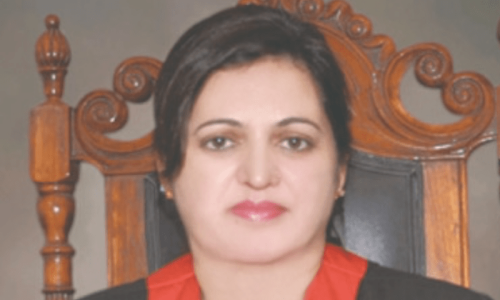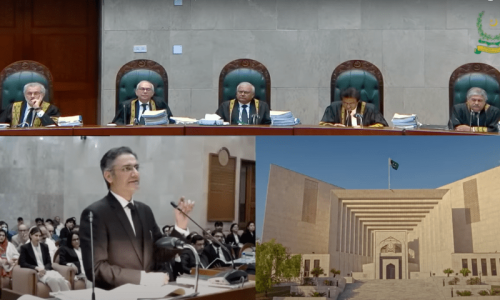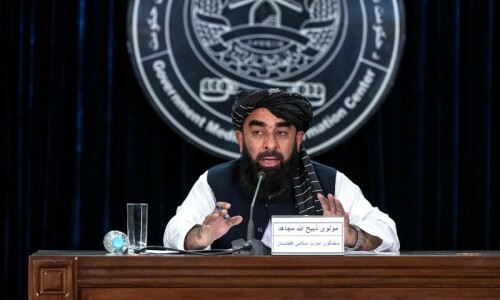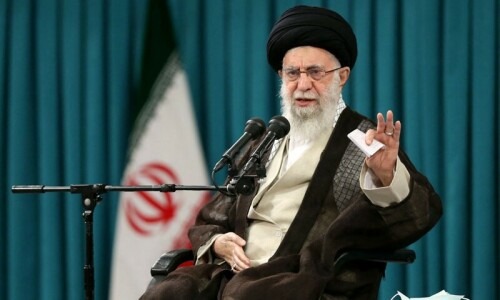ISLAMABAD: The Supreme Court asked PTI vice chairman Shah Mahmood Qureshi on Tuesday to explain why his party had given a “walkover” to the government during the passage of amendments to the National Accountability Ordinance (NAO) 1999.
Headed by Chief Justice of Pakistan (CJP) Umar Ata Bandial, a three-judge bench took up a challenge to the amendments in the NAO, moved by Pakistan Tehreek-i-Insaf chairman and former prime minister Imran Khan through Khawaja Haris Ahmed.
The CJP dropped hints the court might send the amendments back to parliament for reconsideration since it cannot step into the legislature’s shoes.
The CJP also asked Shah Mahmood Qureshi whether questions being raised in the petition were debated and explain if the answer is no.
Qureshi says his party tried its best to make suggestions about amendments to the law during standing committee meetings
Justice Syed Mansoor Ali Shah wondered why the PTI did not put up resistance in parliament when amendments were being made in the NAB law and why should the court consider the petitioner’s locus standi in moving this petition. “If you were so serious about your responsibility, why your party walked out of the assembly,” Justice Shah observed.
Although the apex court issued notices to the federation through the law secretary and the National Accountability Bureau (NAB), as well as Attorney General Ashtar Ausaf, under Section 27-A of the Supreme Court Rules 1980, it did not give any interim relief or stay to the petitioner despite a clear divide in the bench.
While Justice Ijazul Ahsan highlighted the need for an interim relief, Justice Syed Mansoor Ali Shah was of the view that nothing once done can be undone at the final stages of a case.
The CJP observed that an individual had to make “sacrifices for the greater good of the nation”, adding that it was time to “show responsibility” since the court was very sensitive about its time as ordinary litigants suffer when the court hears cases of a political nature.
Shah Mahmood Qureshi replied that his party had tried its best to make suggestions about amendments to the NAO Ordinance during meetings of standing committees, but the ruling coalition managed to get the bill adopted by virtue of its majority in the National Assembly.
Justice Shah wondered whether the apex court could carry out the functions expected of the legislature, observing at the same time the apex court had to tread carefully since parliament’s sovereignty was supreme.
“We have to examine whether the NAB law has brought good to the country and added to its progress or whether it is being used as a political tool. The judiciary has to examine further whether it can strike down the law since it violates the Constitution,” Justice Mansoor Ali Shah said.
Parliament’s powers
Justice Ijazul Ahsan said the moot question was could parliament be given unbridled powers and what was the tipping point that allows the court to step into parliament’s domain.
Only a token resistance was shown by President Arif Alvi when he returned the amendments, but it was later passed through a joint session of parliament, Justice Ahsan recalled.
Chief Justice Umar Ata Bandial observed the NAB law was not confined to public representatives alone, highlighting a consensus that the law was impeding normal government functions since officials thought twice before signing any document.
The counsel argued that amendments in NAB law had obliterated the concept of trust in public representatives _ a bedrock of the parliamentary form of government.
The court observed that the points raised by the petitioner deserved consideration and asked Shah Mahmood Qureshi to explain why debate did not take place in parliament on amendments to the NAB law, adding that “we also expect similar assistance from other parties”. The hearing will resume on Friday.
Published in Dawn, July 20th, 2022















































Dear visitor, the comments section is undergoing an overhaul and will return soon.